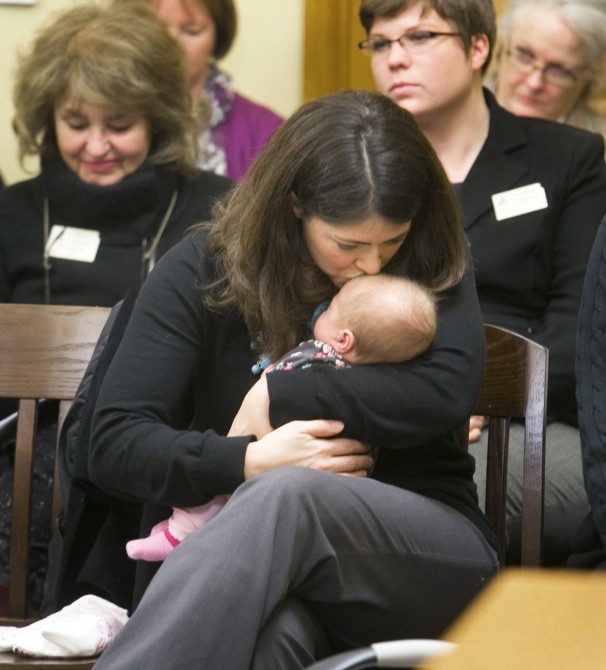WashingtonPost.com
January 29,2014
by Diana Reese
Using a surrogate mother — or “gestational carrier” — may be the only hope for some couples who want to experience parenthood and the joy of creating a family, which would seem to be at the heart of conservative values.
So it’s tough to understand why a staunchly pro-life state senator in Kansas has sponsored a bill to turn surrogate mothers — and the couples who seek their help in having children — into criminals. Yet that’s what Mary Pilcher-Cook, a Republican from Shawnee, has done with Senate Bill 302.
If passed, it would make all agreements, whether oral or in writing, with surrogate mothers null and void. Anyone involved in hiring, or working as, a surrogate could be charged with a misdemeanor, punishable with up to a $10,000 fine and a year in the county jail.
Pilcher-Cook gained notoriety last week on the 41st anniversary of Roe v. Wade by having ultrasounds performed live in front of members of the Kansas Senate’s Committee on Public Health and Welfare, which she chairs. “Because the health committee is very concerned about the health of unborn children and mothers, I thought it would be a great way to give committee members a science education on life within the womb,” she told the Wichita Eagle.
Now she says she wants to start a conversation about surrogacy out of concern for the creation of “a child that you know is purposely not going to have either a biological mother, biological father or both.”
A hearing Monday drew a standing-room only crowd, with emotional arguments presented for both sides. The most creative? Dr. David Grainger, a physician in reproductive medicine, who said, “This bill would have criminalized the most important surrogacy pregnancy this world has ever seen. Mary had a verbal contract with Gabriel. She was carrying a pregnancy that was not her husband’s, and she gave that pregnancy back to God after he was born.”
The bill doesn’t stand much chance of passing, especially after Senate President Susan Wagle, a Republican from Wichita, said she didn’t support it. “Criminalizing surrogate mothers is not a priority of the Legislature,” she said.
It may be the fate of the frozen embryos created during IVF, or in vitro fertilization, that bothers Pilcher-Cook. During last year’s legislative session in Kansas, she said she believed human life began with the fertilization of an egg — even if kept in a freezer because the “value of a human being doesn’t depend on their location.”
“If you live in the middle of Kansas, though, you’re trapped,” she said.
Brisman has become involved in drafting legislation to regulate surrogacy, although the Child Parent Security Act, proposed for New York, has failed to leave committee for two years in a row. (It would also protect the relationship of children and parents in situations other than surrogacy.) New York, Michigan, Washington and Louisiana are the states with the most restrictive laws, she said.
The issue of surrogate motherhood is a complicated one, and some sort of regulation is needed to protect all parties involved.
Not everyone realizes there are actually two types of surrogacy, each with its own set of issues. “Gestational” uses the couple’s own egg and sperm, or donor egg and sperm, to create an embryo through IVF that’s then implanted in the womb of the surrogate. A “traditional” surrogate uses her own egg and is impregnated with sperm from the intended father through intrauterine insemination.
Some opponents of gestational carriers, especially those who do it for profit, believe the practice treats women as human incubators. Is it simply renting a woman’s womb for nine months? Why isn’t it considered demeaning for men to donate their sperm so couples can conceive?
Or could serving as a surrogate be the greatest gift one human being can give to another?



Leave A Comment